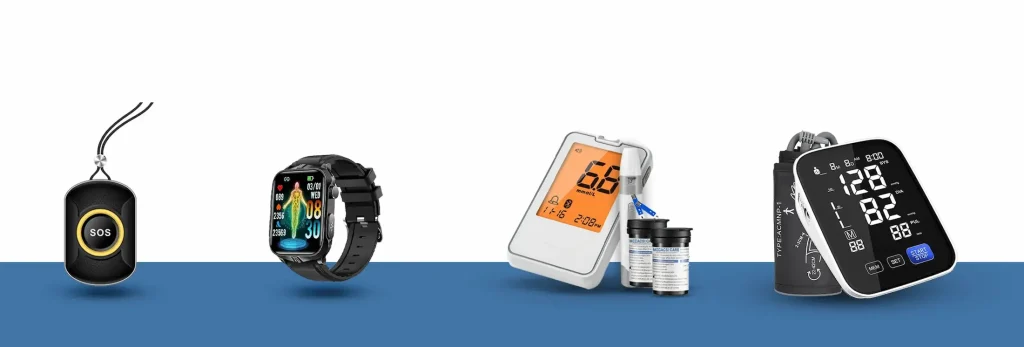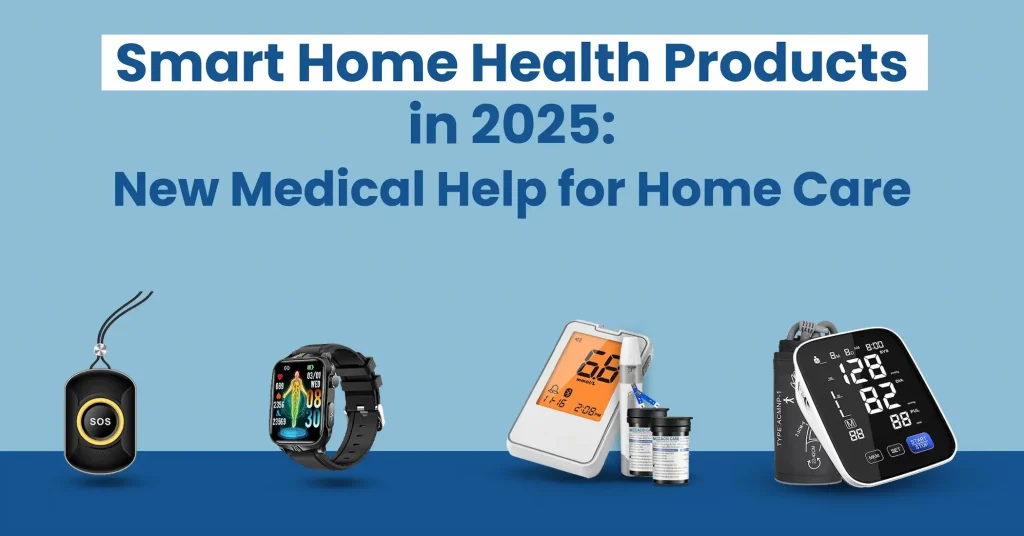Healthcare is changing. It is moving into our homes. The idea of home health products is different now. Old, bulky tools are being replaced. New, smart home health equipment is here. This new gear creates a safer living space. It also helps people feel more connected.
This change is simple. Modern medical devices and health products now use smart technology. These tools do more than just help. They give power back to the user. They offer peace of mind to families. And, they send important data to doctors. Let us see how these new medical products change home care.
Why the Home is Becoming a Health Hub
More people want to age in their own homes. Hospitals want to keep people healthy after they leave. Technology is now easy to use and not too expensive. These reasons created a big push for innovation. Now, your living room can be a center for health.
Connectivity is the real key. Today’s medical equipment for home use is smart. It talks to your phone. It can send information to your nurse. Also, it can tell a family member if there is a problem. This constant flow of information helps stop problems before they start.
What is Durable Medical Equipment?
Durable Medical Equipment, or DME, is the base of home care. This is a special group of medical devices and health products. These items are made for long-term use. They serve a medical purpose. In the past, this meant basic home health products.
Think of hospital beds or simple wheelchairs. Now, the meaning of durable medical equipment is growing. It includes smarter, connected tools. Knowing what counts is important for insurance. A common durable medical equipment list includes:
- Oxygen tanks
- Wheelchairs and scooters
- Special beds
- Walker medical equipment like canes and walkers
- Devices to help lift a person
- Blood sugar testing kits
- electronic blood pressure monitor
Many insurance plans help pay for these. You can find a list of health products covered by medicare online. You can find the official list of health products covered by medicare on the Medicare.gov website. Always consult with your provider to understand your benefits. Always talk to your insurance company first. They can explain your benefits.

The Best New Health Products for 2025
Here are the types of tools making a big difference this year.
1. Smarter Mobility Help: More Than Just Support
Mobility aids are now keepers of safety.
- Smart Walkers: New walker medical equipment has great features. Some have GPS for family tracking. Others can sense a fall and call for help. They may have lights for dark hallways. Some even remind you to rest.
- Better Wheelchairs: These are not just for moving around. They can help avoid bumps in your path. They can learn the layout of your home. Some can even check your heart rate through the handles.
2. Better Health Monitors: The Quiet Helper
This group of tools is growing very fast.
- Smart Vitals Monitors: Tools like blood pressure cuffs work with Wi-Fi. They save your results on an app. This helps your doctor see long-term trends.
- Simple Sensors: These are small devices placed around the home. They can see how you move. They learn your sleep habits. They can tell if you fell. All this happens without you wearing anything.
3. Tools for Treatment and Remembering
It can be hard to follow a care plan. Smart tools are here to help.
- Smart Pill Containers: These do more than hold medicine. They lock it for safety. They beep and flash when it is time for a dose. They can text a relative if a pill is missed.
- Home Therapy Gear: Physical therapy tools are now fun. They use motion sensors and games. They show you how to do exercises the right way. They track your improvement over time.
Comparing Old and New Home Health Tools
| Feature | Basic Equipment | Smart Equipment (2025) |
| Data Keeping | Written notes | Saves automatically online |
| Alerts | None | Sends instant messages for falls or missed pills |
| Instructions | Paper sheets | Voice, video, and phone app help |
| Connections | Works alone | Works with phones, apps, and other home devices |
| Main Goal | Simple help | Prevents problems and manages health |
This chart shows how much better smart medical products are today.
How to Pick the Right Tools for You
Choosing new tools can feel hard. Here is a simple way to decide.
- Know What You Need: What is the main problem? Is it walking safely? Remembering medicine? Let the problem guide your search.
- Make Sure It Fits: Check that the new device works with your phone. See if it can send information to your doctor’s office.
- Ask About Payment: Call your insurance company first. Ask if they help pay for the smart version of the durable medical equipment.
- Pick Easy-to-Use Tools: The best tool is one you will actually use. Choose things with simple buttons and clear instructions.
- Think About a Set: Some brands make several tools that work together. A system that connects a monitor and a pill box can be very helpful.
What Can You Do With Old Equipment?
You might have old gear after you upgrade. Do not just store it in the closet.
- Give It Away: Many local groups need gently used home health equipment. They give it to people who cannot afford new items.
- Sell It: You can sell medical equipment for cash online. Use sites like Facebook Marketplace. Make sure the item is clean and works well.
- Recycle It: If something is broken, recycle it. Your local trash service can tell you how to recycle electronic waste.
A New Chance for Safety and Freedom
The message is clear. Healthcare is focusing on the home. It aims to prevent issues before they happen. Smart home health products make this future real.
They provide more than just medical help. Also, they give confidence. They return independence. Using these tools is not about buying gadgets. It is about building a safer, kinder way to live at home.
FAQ’s
1. What is durable medical equipment?
Durable medical equipment is tools for medical use. They are designed for long-term use at home. Examples include wheelchairs, shower chairs, medical walkers and portable commode etc.
2. Does Medicare cover smart home health equipment?
Medicare often covers basic durable medical equipment. Coverage for smart devices can vary. You must always check with Medicare directly. Ask about the specific item you need.
3. What is the best smart home health device for safety?
Non-wearable sensors are excellent for safety. They are placed around the home. They can monitor movement and detect falls without cameras.
4. What is on a durable medical equipment list?
A common list includes walkers, wheelchairs, and hospital beds. It also includes patient lifts and blood sugar testing kits. Your doctor can provide a full list.
5. Are smart walkers easy to use?
Most smart walkers are designed for simplicity. They often have one-button functions. Their main features like fall alerts work automatically.
6. What is the difference between rollator and simple walker?
A walker is a basic frame you lift to move. A Rollator is a wheeled walker with a seat. It often includes a storage basket and hand brakes.

